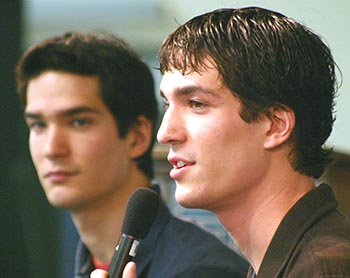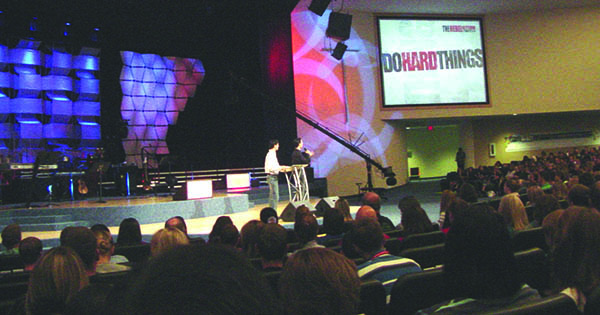The “REBELUTION”: How Two Homeschool Grads are Reaching Out to Their Generation
By Sarah Pride
Printed in Practical Homeschooling #96, 2010.
 Brett and Alex Harris are starting a movement. Here's what it is about.
Brett and Alex Harris are starting a movement. Here's what it is about.

|
 |

Making it rain. Indoors. Like a conductor directing an orchestra made
of human instruments from the stage at the front of the large room,
Brett Harris pointed to one section of the audience, then another. The
roomful of teenagers and their parents delightedly rubbed their hands
on their thighs, snapped their fingers, clapped, and then clapped and
stomped. It sounded for all the world as though a heavy rainfall
clattered against a metal roof. Then Brett directed everyone back
through the actions in reverse order, and the “rain” disappeared.
“This was just a reminder,” Alex Harris said into the microphone,
“that most hard things need more than one person. But together, we can
make it rain.”
It was a beautiful moment, memorable, a perfect way for the twin
Harrises to end the last conference of their 2010 “Do Hard Things”
Rebelution tour. Sure, “making it rain” is an old schtick, one I’ve
witnessed before. But it works. Like everything else the Harrises have
done so far as they’ve become the current role models of evangelical
teens, the classic stunt is true. And it’s truth the world needs, not
novelty.
When I first heard of Alex and Brett and their “Rebelution” in 2008, I
was suspicious. Our parents had always taught us Pride kids exactly
what the Harrises were saying—teens can and should do much more than
people expect. I grew up traveling with my parents to homeschool
conventions and helping to assemble books and magazines. In a way,
because I lived it, I thought this truth was obvious.
Apparently, though, Alex and Brett saw what the rest of us missed.
They read the excellent books their parents, Gregg and Sono Harris,
gave them at the exact same moment they were meeting the world with
fresh eyes. They caught a snapshot of reality that showed them other
teens needed to hear the same truth. And because of their upbringing
in a family of homeschool pioneers, watching huge conventions being
produced by their father and older brother (Josh), the twins possessed
the knowledge and connections to make their own voices heard.
Brett told me once that he and Alex were “in the right place at the
right time.” I dismissed the comment as simply him being modest, but
over time I have started to wonder if this is true. Here’s their
story; we can judge for ourselves.
First, the twins were born smart. Even more importantly, they combine
their intelligence with an unusual ability to run conferences, learned
from growing up in the same family as parents Gregg and Sono and older
brother Josh. As teenagers, they joined the National Christian
Forensics and Communications Association (NCFCA), an organization that
didn’t exist when I was growing up. Here, they expanded their public
speaking skills. At age 16, their father handed them a large stack of
influential books, which they read. Then they started their blog, the
“Rebelution,” asserting that teens can and should achieve real-world
goals.
Thanks to their family connections, the twins’ blog received an
initial audience most teenagers’ writing would not. So an Alabama
supreme court justice read their blog and challenged the 16-year-olds
to live up to their words. After a successful internship in his
office, Alex and Brett soon found themselves organizing hundreds of
teens in a grassroots effort to help four campaigns for the Alabama
supreme court. Although their candidates did not win, the effort built
the experience and connections the Harrises needed to make a real
difference in former Arkansas governor Mike Huckabee’s bid for the
presidency throughout 2007.
The real tipping point for the Harrises’ ministry came when their
friend Randy Alcorn printed out one of their campaign emails to show
martial artist Chuck Norris at an informal get-together. Norris began
to talk about Huckabee wherever he appeared, several times a day, and
he referred to the twins at the same time as “two guys from Oregon.”
Needless to say, even more people sought them out. They appeared on
TV, wrote Do Hard Things (see sidebar), and ran a series of
conferences. In 2008, I met them for the first time, when they visited
Patrick Henry College—where I graduated in 2007, and where I’ve been
working ever since as webmaster, editorial assistant, videographer, et
cetera.
I like the Harrises very much as people, and I’m proud to count myself
among their many friends. I’ve written about them several times on the
PHC website. In this article, however, I am much more interested in
what the Harris twins’ sudden popularity tells us about the culture
and current status of homeschooling in the United States.
When I grew up, my homeschooled compadres did not sport iPhones and
digital movie cameras. Mostly, the homeschoolers wore jeans jumpers
and won every national academic competition imaginable. We memorized
quick and easy answers to the question, “What about socialization?”
and used them several times a week.
Five years ago, however, I began to notice that people no longer
looked at me funny when I mentioned my educational background. Often,
a kid would sigh wistfully, “I wish I could be homeschooled!” And
parents asked questions, rather than issuing a challenge.
So in 2006 I researched and wrote a 100-page research project that
documented the improvement in public opinion toward homeschooling. I
found that two things had happened simultaneously. First, the
homeschool movement, like anything else new, had happened in waves. A
first wave of individualist innovators cleared the soil, and a second
wave of visionaries developed the ground. On top of this foundation,
now, a third wave of regular people from every demographic had
settled. At the same time, the general opinion of everyday Americans
had shifted against the public school system. Now, anyone can
homeschool, and anyone does. And, whether homeschooled or not, the
average American teen will often agree that the public school system
does not easily support strong, creative thinkers.
The Harris twins have therefore found themselves in the position of
giving a voice to high-achieving teens across a variety of
demographics, whether homeschooled or not. Where a weak point lies in
the culture, they stand, at least for the current moment.
These young men have taken advantage of every opportunity that has
come their way and have worked tremendously hard. But they have also
been born into a family with an unusual heritage that gave them a
voice at a young age. In their time and place—the current time and
place—homeschooling is “cool.” No longer the radical fringe, it is now
the cutting edge.